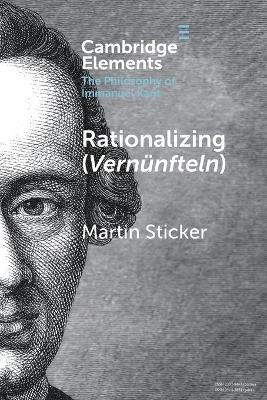
Rationalizing (Vernünfteln)
Seiten
2022
Cambridge University Press (Verlag)
978-1-108-71442-6 (ISBN)
Cambridge University Press (Verlag)
978-1-108-71442-6 (ISBN)
This Element presents a conception of rationalizing informed by the full spectrum of examples Kant provides to illustrate the phenomenon. These examples range from moral-psychology to philosophy to religious contexts to politics and everyday discourse.
Kant was a keen psychological observer and theorist of the forms, mechanisms and sources of self-deception. In this Element, the author discusses the role of rationalizing/Vernünfteln for Kant's moral psychology, normative ethics and philosophical methodology. By drawing on the full breadth of examples of rationalizing Kant discusses, the author shows how rationalizing can extend to general features of morality and corrupt rational agents thoroughly (albeit not completely and not irreversibly). Furthermore, the author explains the often-overlooked roles common human reason, empirical practical reason and even pure practical reason play for rationalizing. Kant is aware that rationality is a double-edged sword; reason is the source of morality and of our dignity, but it also enables us to seemingly justify moral transgressions to ourselves, and it creates an interest in this justification in the first place. Finally, this Element discusses whether Kant's ethical theory itself can be criticised as a product of rationalizing.
Kant was a keen psychological observer and theorist of the forms, mechanisms and sources of self-deception. In this Element, the author discusses the role of rationalizing/Vernünfteln for Kant's moral psychology, normative ethics and philosophical methodology. By drawing on the full breadth of examples of rationalizing Kant discusses, the author shows how rationalizing can extend to general features of morality and corrupt rational agents thoroughly (albeit not completely and not irreversibly). Furthermore, the author explains the often-overlooked roles common human reason, empirical practical reason and even pure practical reason play for rationalizing. Kant is aware that rationality is a double-edged sword; reason is the source of morality and of our dignity, but it also enables us to seemingly justify moral transgressions to ourselves, and it creates an interest in this justification in the first place. Finally, this Element discusses whether Kant's ethical theory itself can be criticised as a product of rationalizing.
1. Introduction; 2. Rationalizing in Context; 3. Rationalizing and the Natural Dialectic; 4. The Cunning of (Empirical Practical) Reason; 5. Apparent Justifications, Ideology, and Uncritical Philosophy; 6. Whose Rationalizing?; Abbreviations; References.
| Erscheinungsdatum | 17.01.2022 |
|---|---|
| Reihe/Serie | Elements in the Philosophy of Immanuel Kant |
| Zusatzinfo | Worked examples or Exercises |
| Verlagsort | Cambridge |
| Sprache | englisch |
| Maße | 152 x 228 mm |
| Gewicht | 131 g |
| Themenwelt | Geisteswissenschaften ► Philosophie ► Geschichte der Philosophie |
| Geisteswissenschaften ► Philosophie ► Philosophie der Neuzeit | |
| Sozialwissenschaften | |
| ISBN-10 | 1-108-71442-0 / 1108714420 |
| ISBN-13 | 978-1-108-71442-6 / 9781108714426 |
| Zustand | Neuware |
| Informationen gemäß Produktsicherheitsverordnung (GPSR) | |
| Haben Sie eine Frage zum Produkt? |
Mehr entdecken
aus dem Bereich
aus dem Bereich
eine Geschichte der Zuversicht von Homer bis zum Klimawandel
Buch | Hardcover (2024)
C.H.Beck (Verlag)
28,00 €
die kolonialen Wurzeln der französischen Theorie
Buch | Hardcover (2024)
Matthes & Seitz Berlin (Verlag)
28,00 €


